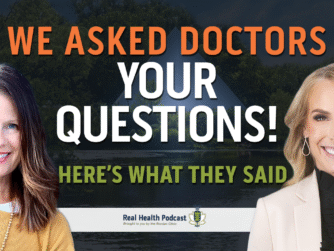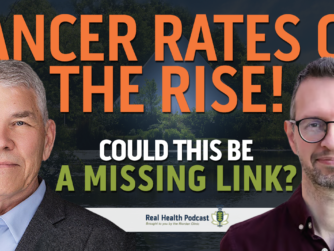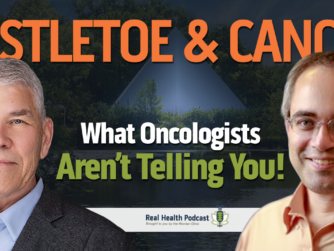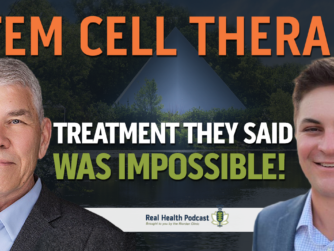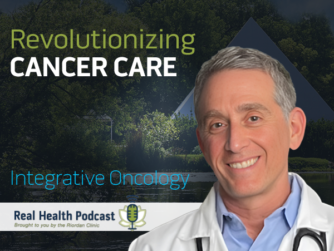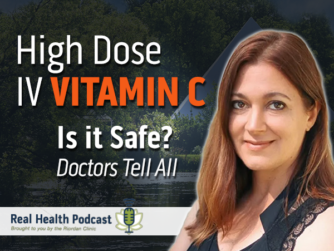In this episode of the Real Health Podcast, Chief Medical Officer Dr. Ron Hunninghake, MD, and Susan Brown, PhD, CNS, and director of The Center for Better Bones, discuss how an alkaline and pH-balanced diet, along with exercise and stress management can help preserve bone health.
Thanks to this Episode’s Sponsor
Links
Learn more about the host: Dr. Ron Hunninghake:
https://riordanclinic.org/staff/ron-hunninghake-md/
Learn more about the guest: Dr. Susan Brown:
Read the Transcript
Disclaimer: The information contained on the Real Health Podcast and the resources mentioned are for educational purposes only. They’re not intended as and shall not be understood or construed as medical or health advice. The information contained on this podcast is not a substitute for medical or health advice from a professional who is aware of the facts and circumstances of your individual situation. Information provided by hosts and guests on The Real Health Podcast or the use of any products or services mentioned does not create a practitioner-patient relationship between you and any persons affiliated with this podcast.
Intro: This is the Real Health Podcast brought to you by Riordan Clinic. Our mission is to bring you the latest information and top experts in functional and integrative medicine to help you make informed decisions on your path to real health.
Dr. Ron Hunninghake: Well, welcome everyone to another episode of the Real Health Podcast. I’m Dr. Ron Hunninghake. I’m the Chief Medical Officer here at the Riordan Clinic, and we have as our guest today, Dr. Susan Brown, who is the director of the Center for Better Bones and has been spending over 30 years looking at the impact of diet on the quality of your bone health. So first of all, Susan, welcome to the Real Health Podcast.
Dr. Susan Brown: Thank you very much. I’m happy to be here.
Dr. Ron Hunninghake: Yeah. So I’m excited when someone has devoted so much of their life. You’ve got a great depth of knowledge and you’re especially keyed into the importance of balancing pH, especially getting away from excessive acids and more to an alkaline type diet for better bones. And so I was going to just ask you to give a little bit of a foundation to our listeners as to why this makes a big difference in terms of their healthy bones.
Dr. Susan Brown: Well, it’s very interesting. My first career was actually, I’m an anthropologist as well as a nutritionist. And I began looking around the world with bone health when my grandmother fractured a hip at a 101 years old. A 101 years old. She was living alone, fell in a bathtub. I always wondered what were we thinking of? And then I realized she had both osteoporosis and rickets, and I thought, how long would she have lived if she didn’t have these problems? And then a few years later, I realized I was told I had osteopenia. So I said, “Wow. I want to really get serious about this.” I started looking around the world and realized there were many cultures where people had much less, 10 times less, 20 times less fracture rates than we do. So I started thinking, what’s the difference between these cultures? And then I got really deeply into the question of lifestyle, but more particularly nutrients, more particularly nutrient intake, more particularly minerals. And then we got into the question of pH balance. When you start looking at the diets through history and through evolution, you’ll get the basic principles.
Dr. Ron Hunninghake: Yeah. And so one of the things I’ve learned is that we’ve become very depleted in minerals.
Dr. Susan Brown: Yes.
Dr. Ron Hunninghake: I remember being on my grandma’s farm when I was probably five or six years old, and it was out in the country and she turned on the… They did have an electric pump, but when I drank the water, I thought, “What’s with this water?” It just didn’t taste the same. And it was very rich in minerals.
Dr. Susan Brown: That’s right.
Dr. Ron Hunninghake: And now we take a lot of the minerals out, especially magnesium. We’re very magnesium deficient.
Dr. Susan Brown: Right.
Dr. Ron Hunninghake: So go ahead. I didn’t mean to but interrupt you, but I think the minerals story is huge in terms of-
Dr. Susan Brown: No. And I think we believe that bone health is related to certainly mineral depletion, which is extremely important. And increasing everyday magnesium has been well overlooked. In our mind, it’s more important than calcium to bone health, and it’s certainly been overlooked and the vast majority of people do not consume enough, and also, it’s related to antioxidant deficit. We don’t realize that we constantly are putting a big oxidative burden on the body, and that affects the osteoblasts. So we find enriching the antioxidants is extremely important. And then when you look cross culturally, you see that these cultures, well, if you think of it, few million years of human evolution, we just ate natural whole foods.
Dr. Ron Hunninghake: Right.
Dr. Susan Brown: We ate everything that we could possibly digest, whether it was an insect or a bark, and these are all very nutrient rich. And so we’ve come from a very nutrient rich and a mineral rich diet. Anthropologists estimate that our mineral intake, take magnesium, for example, was two or three times higher than it is today. And today, in New York where I live, and actually in the whole country, one out of three people do not even have one whole fresh fruit or one whole vegetable a day. So we’ve come from eating naturally all whole fresh foods to eating maybe one every other day. It’s like a dramatic change in the body. Our genetics don’t change that quickly. Our genetics are the same genetics of 10,000 years ago, 20,000 years ago, which require a lot of minerals to maintain pH balance. And pH balance is the most critical variable in the human body.
You can live a while if your blood pressure’s not right. You can live a while if your blood sugar’s not right, but if your pH isn’t right, you die very quickly. And so the body sacrifices minerals from bone. And what you might not know is it also sacrifices muscle. Muscle is also broken down to get out-
Dr. Ron Hunninghake: Osteopenia and sarcopenia.
Dr. Susan Brown: Sarcopenia.
Dr. Ron Hunninghake: Not enough.
Dr. Susan Brown: Exactly. So the body is always working to adapt to this relatively new diet, particularly the last hundred years. The soils have become very depleted. Our nutrient intake is much worse with all this processed food and artificial food and all these treatments to the soil which damage nutrient content. So we’re running on our reserves and our reserves are running out.
Dr. Ron Hunninghake: So how would people know whether or not they were eating an acid food versus an alkaline food? Just let’s get to some real simple basics.
Dr. Susan Brown: Some real simple things are, you look at the high mineral foods, but basically all the vegetables… In fact, my book, this Acid-Alkaline Food Guide, is really all about which foods, tables of foods, which foods alkalize, which foods acidify, and various different ways of calculating that. The Germans have figured out one way. Some people in this country have figured out another way, but it’s basically about the mineral content as opposed to the fruits, vegetables, nuts and seeds, as a whole, all alkalize the body. They all help provide these buffering mineral compounds. Whereas the protein, all protein is acid forming. Now we need protein, but protein is acid forming. But more important, all of these highly processed foods, they’re very… Sugars, caffeine, alcohol, all this stuff is very acid forming, much less the grains, all the refined grains. So the bulk of our diet is acid forming. In fact, the average person produces about 50 or a hundred milliequivalents of excess acid a day, and the body has to pull out of bone and muscle to buffer that unless we take the nutrients.
Dr. Ron Hunninghake: Right. Right. So our whole message to patients about diet, and people can got up in the controversies of diet, but I think pretty much everyone agrees if you eat real foods.
Dr. Susan Brown: Yeah. That’s a good start.
Dr. Ron Hunninghake: Real foods. Colorful foods.
Dr. Susan Brown: Yeah, yeah, yeah.
Dr. Ron Hunninghake: Lots of vegetables.
Dr. Susan Brown: Right.
Dr. Ron Hunninghake: And then be careful about overdoing the meats.
Dr. Susan Brown: Right.
Dr. Ron Hunninghake: And stay away from refined packaged foods.
Dr. Susan Brown: Right.
Dr. Ron Hunninghake: Not only in terms of the mineral content, but they’ve got all the wrong oils. The oxidized.
Dr. Susan Brown: Right. Exactly.
Dr. Ron Hunninghake: Vegetable oils and see if the oils that are in nuts, those are preserved. They’re not oxidized. And so you can get good vegetable oils out of whole foods. So this is the message we’ve had. But what you’re saying that because in the west, the western diet, we’ve gotten away from these types of foods. Now this is one of the reasons we’re suffering so much from osteopenia and osteoporosis.
Dr. Susan Brown: That’s exactly right. That’s exactly right. We’ve taken on a very low mineral diet. And some people, you don’t even know it because you think, “Oh, well, these potatoes got so much zinc. This bean has got so much potassium or magnesium but the depletion of the soils had led…” Even if you’re eating the food, you can’t be sure you’re getting the nutrients. You have to try to get high quality organic foods.
Dr. Ron Hunninghake: Yeah. Okay. So do you talk very much in terms of exercise or in terms of are there other factors besides diet that you’ve seen to be additive to the alkaline diet?
Dr. Susan Brown: Sure, sure. We at the Center for Better Bones, we’ve developed a six step program for bone health. And we’ve really emphasized that there’s many key nutrients, like 20 key bone nutrients. So we always have people. If people want to know those 20 key nutrients, they just go to betterbones.com. Look at the big picture on bone health. So nutrition is really important. The pH balance, which is essentially a measure of mineral reserve. We actually have developed a little kit that people can measure their first morning urine, which helps them see if they are really in the acid, if they have too high of an acid load or not and that’s really helpful.
And then of course, our next step is exercise. And it’s quite simple. If you build muscle, you build bone. The bone and muscle are really one single unit. We lose them together. We gain them together. So that’s a gigantic problem with sarcopenia and the loss of muscle. And as you know, our lifestyle, we’re very sedentary, especially the upper body. We might work the lower body, but not the upper body so much. The most interesting work is from the Australian Bone Clinic, Dr. Belinda Beck, who has women even 60, 70 building substantial new bone with strength training and they’re starting some of these programs in the US, strength training, you can build bone.
Dr. Ron Hunninghake: Yeah. Strong women, strong bones.
Dr. Susan Brown: Yes. Exactly.
Dr. Ron Hunninghake: Yeah.
Dr. Susan Brown: Exactly. Exactly. So exercise is really important. You have to have good digestion. If you’re not digesting the things, that’s really important. But the most interesting thing we’ve discovered is that stress has a big impact on bone.
Dr. Ron Hunninghake: Oh, wow.
Dr. Susan Brown: And even having worrisome thoughts, they’ve found even have a thought of worrying about eating this food is going to cause weight gain, for example, that will cause you to actually have an increase in bone breakdown. Cortisol is very, in our thoughts, one thought we can produce a burst of cortisol and a burst of stress hormones that directly damage bone. And even more than that, you’ll find this interesting, doctor, that they’ve discovered at Columbia University, when we have a stress, when we have a fear response, the first organ to respond to fear is bone. And what it does, it gives up its osteocalcin, this bone building protein to put it into general circulation, to quiet down the parasympathetic nervous system so you can just go fight or flight full time. It’s very striking how bone sacrifices itself. And I bet if you ask your clients, so many people ask me, could stress be affecting my bone? It’s very clear it does.
Advertisement: There’s a lot more to this conversation, and it’s coming up right after a quick break. Today’s podcast is brought to you by LivOn Labs, makers of liposomal vitamins and supplements. LivOn uses liposomal encapsulation technology to protect nutrients from destruction in the digestive system. This allows for more efficient delivery of essential vitamins and nutrients. Choose from various supplements that support health and well-being such as Lypo-Spheric vitamin C, magnesium, glutathione, and more. To learn more, visit LivOn Labs, that’s L-I-V-O-N labs.com.
Dr. Ron Hunninghake: A lot of people are now spending so much time indoors. We’re not getting the sunshine, we’re not getting the vitamin D. But even beyond the sunshine and vitamin D, there’s something about maybe going outside and walking in the grass barefoot as a way to reduce your stress.
Dr. Susan Brown: Yes. Yes. Yes.
Dr. Ron Hunninghake: Or go for a walk, breathe the fresh air. All these things are things that people are not doing because we’re watching too many screens and we’re afraid to go outdoors and we just need to get out again. Kids are not playing outdoors like they used to.
Dr. Susan Brown: Yeah. For kids, it’s a dramatic thing because we could solve this whole problem. If you made the kids bone density even 10% stronger during adolescence, when you put down 50% of your bone mass, they would present half the fractures because people prevent half the elderly fractures because when you got to be old, you’d have enough reserve that you could use up and it’s truly a striking thing. We forget that we’re part of nature and we have to be out in nature. And anybody who experiments will probably say, “I feel better. I feel better when I go out and do this walk. I feel better if I go through the forest. I feel better if I spend time in the fresh air.” So yes.
Dr. Ron Hunninghake: Do you think the hormone deficiencies that women are experiencing after menopause, is that related to the diet or is that just… Because women have been going into menopause forever, but they haven’t always had the same level of osteoporosis that we’re seeing these days.
Dr. Susan Brown: Exactly. Exactly. One of the first things, my first book was called Better Bones, Better Body and I really looked across culturally and showed many cultures that they didn’t even have menopausal symptoms. They just made that transition smoothly. We are out of balance. Many women have very significant menopausal symptoms, and the more hot flashes you have, the more likely is the bone loss is severe. That seems to be correlated. It has to do with the endocrine imbalance. And so there’s many different ways of dealing with that. We at the Center for Better Bones, we prefer to enhance the natural function rather than replace them when at all possible, but yeah. The diets, we’ve strayed from the natural order. We got to get back there a little bit.
Dr. Ron Hunninghake: And a lot of people are getting their bone density measured and they go to the doctor, but the tendency is to, “Here’s your magic pill,” which unfortunately, rewards not changing your lifestyle.
Dr. Susan Brown: Yes. Yes.
Dr. Ron Hunninghake: We’ll just fix this by doing something that’s going to trick the bone into not deteriorating as fast, but it doesn’t really replace all the things that you’re mentioning here that we need to do to take better care of our bones and grow our bones on an ongoing basis.
Dr. Susan Brown: Yes. And our whole campaign is better bones, better body. We use bone health concern as a portal to build overall health. You can’t separate the bones from the muscle, from the kidney, from the liver. It’s all one unit. And so if you do something that’s good for the bone, but it’s going to cause cancer, that’s not the right direction, or you do something for bone that’s going to damage your digestion. We work with people who want to maximize all of their health and try to use an interest in bone as an opportunity to say, “Hey. A window of opportunity,” say, “I’m going to take a big broad picture of my health and try to improve it.” Yeah. And the drugs don’t work that well. You look at this, you’ve got to treat 20, 50 people to prevent one fracture for three years with very expensive drugs. So you’d like to get in a position where you didn’t have to do that.
Dr. Ron Hunninghake: So we have to start young and think about how we’re going to take care of ourselves and stay active and eat better and get sunshine and do all these things.
Dr. Susan Brown: Right. Right. Right.
Dr. Ron Hunninghake: But it’s all pretty logical if people would think about it.
Dr. Susan Brown: Yes, exactly.
Dr. Ron Hunninghake: It’s not like this is some mysterious thing that we’re talking about, but what you’ve done in your career is you’ve provided the evidence that if people do make the right choices, and I like your notion of just having people get a little pH paper and check their pH in the morning because that can give you an indication. Dr. Riordan was a big on measuring things. If you measure things, then you know if you’re off track and you can make changes in your navigation so that you can get back to your goal of where you want to be. And so by doing that simple little test each morning, you’d be able to tell whether or not you’re doing a good job of getting your diet in good shape.
Dr. Susan Brown: And we have a whole pH test kit at betterbones.com, which has lists of diet and how to do the diet and it has the book. It has the book, the Alkaline Diet Starter Kit. But doctor, your work at your clinic is extremely important because we must measure, every serious case of bone loss has a reason and so you want to figure out what’s going on. Is it vitamin D deficiency? Is it loss of calcium in the urine? Is it high cortisol? Is it low DHEA? Is it parathyroid?
So it’s very important. In fact, we’ve listed the most important test that a person should really… If the doctor says, “This is such a serious thing, you should take a drug.” Then you say, “Hey, Doc. If it’s that serious, let’s figure can we uncover any of the causes for it?” So on betterbones.com, we have this medical osteoporosis workup, and people can look at that list and say, “Have I had these tests?” Because it’s extremely important to uncover the causes. Many times there’s hidden causes of bone weakening that can our standard tests that should be done. But the doctors are so busy, they just say, “Take a drug.” And a person has to take responsibility and say, “I want these tests. I want to know, can you help me find a cause to this?”
Dr. Ron Hunninghake: Well, what Dr. Riordan found is that if you measure something and you find a deficiency, people will respond to information. If you just say, “Get out there and get some exercise,” they’ll say, “Okay. I will.” But then they don’t. But if you’ve done this kind of a workup, which we do something similar to this, but I’m going to be sure and take a look at if we can identify specific things that can be corrected and clearly show this to the patient, they’ll go for it. Because information is motivation.
Dr. Susan Brown: Yeah. And I would love to learn more about your… I’ve seen that you have test offerings. We’re from New York, and it’s really hard for people to self-order tests. But I would like to know more about your service because my clients really understand the value of testing, and it’s central to what we do. And I see people all over the world so they could take advantage of your services.
Dr. Ron Hunninghake: Well, this is the Riordan Clinic, but Dr. Riordan, when he first started it, it was The Center for the Improvement of Human Functioning. And the whole thing was to measure, measure, measure. Because again, without measurements, you’re just shooting in the dark.
Dr. Susan Brown: Right. Right. Right.
Dr. Ron Hunninghake: And plus, you also don’t… One of the neatest things is to have people come back in a year and remeasure some of these things.
Dr. Susan Brown: Yes, exactly.
Dr. Ron Hunninghake: And to see that they’ve actually made a difference.
Dr. Susan Brown: Yes.
Dr. Ron Hunninghake: Because a lot of times, you don’t see the growth of your bones. You don’t feel it.
Dr. Susan Brown: Yeah. That’s right. That’s right.
Dr. Ron Hunninghake: It’s a slow thing. So anyway. Well, I’m very pleased with what you’re doing, and I’m definitely wanting to get your book and share it with people. And I’m going to look into getting some of your kits and see if we can use that with patients as well.
Dr. Susan Brown: Yeah. Just see how it works with people. And I want to look into your testing that… Like I say, in New York, it’s tough to look at for the public as a whole, to help them understand another source where they can get some of this basic testing because it’s very important. I, myself, had many nutrient deficits when I went to study. Some friends who taught me about when I was just an anthropologist, and I was surprised at my own nutrient deficiencies and what a big difference that made. I was laboring under anemia and I didn’t even recognize it, for example. And so it’s a very good thing to start paying attention.
Dr. Ron Hunninghake: We humans are so darn adaptable.
Dr. Susan Brown: Yes.
Dr. Ron Hunninghake: We adapt to pathology, and we don’t realize that we’re sick or that we have bad bones. And so without some kind of measurement, motivation is lacking for most people.
Dr. Susan Brown: Yes. Yes.
Dr. Ron Hunninghake: Well, Dr. Susan Brown, I’m so pleased that you were on our program.
Dr. Susan Brown: It’s my pleasure. And I want to thank you for the great work that you’ve been doing all these years, and hopefully, we can work together.
Dr. Ron Hunninghake: Yes.
Dr. Susan Brown: And get the word out that women and men alike can do simple things to make for strong bones.
Dr. Susan Brown: And our mission is really to alter the way people think about bone health and the way people are treated on bone health. We must expand that horizon and have a more broad, holistic, whole body approach to bone health.
Dr. Ron Hunninghake: Absolutely. Well, thank you very much and wishing you good health in the future.
Dr. Susan Brown: It’s my pleasure. Nice talking to you. Good luck to everyone.
Dr. Ron Hunninghake: Thank you, Susan. Bye-bye.
Dr. Susan Brown: Bye-bye.
Outro: Thank you for listening to the Real Health Podcast. If you enjoyed this episode, be sure to subscribe and leave us a review. You can also find all of the episodes and show notes over at realhealthpodcast.org. Also, be sure to visit riordanclinic.org where you’ll find hundreds of videos and articles to help you create your own version of Real Health.


